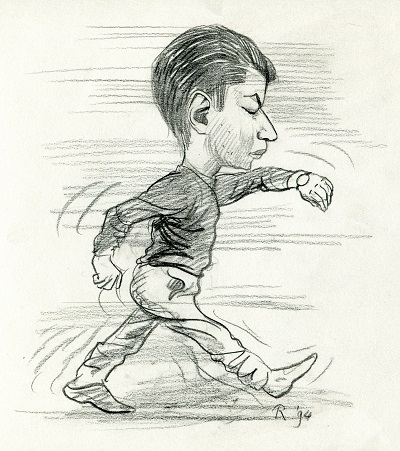
Around 1980, France wasn’t especially strong as a chess nation – there wasn’t even one French grandmaster at that time. With the coming of Spassky in 1984, France got a world top player thrown into its lap. At three Olympiads (1984-1986-1988), Spassky defended the honour of his adopted country with verve.
Joël Lautier was the first great French talent that managed to push through to the world top after that. As a seventeen-year-old, he made his debut on first board for France at the Malta Olympiad in 1990. In the same year, he became a grandmaster, and proceeded with rapid strides in the direction of the world top, as we can see in Rupert’s cartoon.
Lautier can be seen as the leader of a new generation of French chess players: in 1995, Etienne Bacrot became the U12 World Champion in Brazil, and he grew out to be a top player. Today, Maxime Vachier-Lagrave is the flag-bearer, who has been in the top ten of the Elo rating list for years. In the struggle for the world title, neither of the three has been able to play a significant role so far, although ‘MVL’ is in the lead in the Candidates Tournament in Yekaterinburg that was broken off recently.
In 1997, Lautier married the love of his youth, the Moldavian chess player Almira Skripchenko. In 2003, she was one of the founders of the Association of Chess Professionals (ACP). Although she and Lautier got divorced in 2002, she did manage to seduce him into becoming the chairman of the ACP. At the time, the ACP wanted to do something about the many draws in chess. Among other things, they considered a time penalty for a player whose draw offer got refused. Another idea was the following: the player who is offered a draw is given the right to turn the board around and thus, as it were, take over the position of his opponent. Interesting ideas, but that is what they remained: ideas.
Lautier is one of the few players with a plus score against Garry Kasparov. In 1994, he beat the World Champion in Linares, and one year later he repeated this feat during the VSB tournament. This was compensated by one defeat only (at the 1994 Olympiad), along with a considerable number of draws. Lautier stopped as a professional player in 2008, and has been living and working in Moscow for years. However his contribution to the revival of French chess should not be underestimated! (ES)